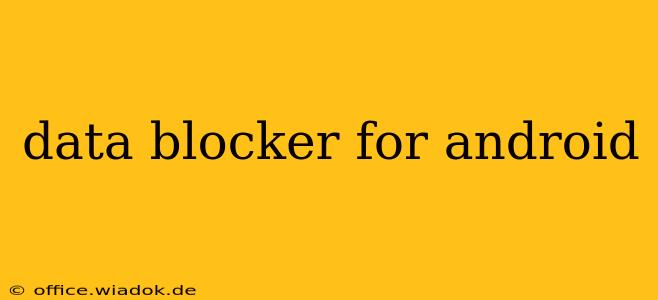Are you tired of unexpected data overages and the frustration of constantly monitoring your mobile data usage? A data blocker for Android can be your lifeline, offering granular control over which apps consume your precious mobile data. This comprehensive guide explores the benefits of using a data blocker, explains how they work, and provides recommendations for choosing the right one for your needs.
Understanding the Need for a Data Blocker
In today's hyper-connected world, our smartphones are constantly vying for data. Background apps, automatic updates, and streaming services can quickly drain your data allowance, leading to hefty bills and frustrating internet speed throttling. A data blocker acts as a gatekeeper, allowing you to meticulously manage which apps access mobile data and when.
Key Benefits of Using a Data Blocker:
- Cost Savings: Prevent unexpected data overages and reduce your monthly mobile bill significantly.
- Improved Performance: Reduce background data usage, leading to faster loading times and a smoother overall mobile experience.
- Enhanced Privacy: Limit the amount of data apps collect, potentially enhancing your online privacy.
- Better Battery Life: Reducing data usage can positively impact your phone's battery life.
- Control & Awareness: Gain a clear understanding of your app's data consumption habits.
How Data Blockers for Android Work
Data blockers utilize a variety of techniques to restrict data usage. Most commonly, they work by:
- Background Data Restrictions: Preventing apps from accessing mobile data when they're not actively in use.
- App-Specific Data Limits: Allowing you to set individual data limits for specific apps, ensuring none consume excessive amounts of data.
- Scheduled Data Access: Enabling you to specify time periods when certain apps can access mobile data.
- Data Usage Monitoring: Providing detailed reports and visualizations of your app's data consumption patterns.
- Wi-Fi Prioritization: Automatically switching to Wi-Fi whenever available to conserve mobile data.
Choosing the Right Data Blocker for You
The Android market offers a plethora of data blocker apps. Choosing the right one depends on your specific needs and preferences. Consider these factors:
Key Features to Look For:
- Intuitive Interface: A user-friendly interface is crucial for easy management of your data usage.
- Granular Control: The ability to set individual data limits for each app provides maximum flexibility.
- Comprehensive Reporting: Detailed data usage reports offer valuable insights into your consumption patterns.
- Scheduled Data Access: The ability to schedule data access based on time or location is a highly useful feature.
- Whitelist/Blacklist Functionality: The ability to easily add apps to a whitelist (always allowed) or blacklist (always blocked) saves time and effort.
- System Integration: Seamless integration with the Android OS for optimal performance.
Potential Drawbacks
While data blockers offer numerous advantages, it's important to acknowledge potential drawbacks:
- App Compatibility: Some apps may not function correctly with certain data blockers.
- Learning Curve: Some apps may have a steeper learning curve than others.
- Potential for Errors: Incorrect configuration can lead to unexpected data usage.
Conclusion
A data blocker is an invaluable tool for Android users seeking greater control over their mobile data usage. By carefully considering your needs and selecting an app with the right features, you can effectively manage your data consumption, saving money and enhancing your mobile experience. Remember to thoroughly research different apps and read user reviews before making a decision. Taking control of your data usage empowers you to enjoy your smartphone without the constant worry of overages and unexpected costs.

